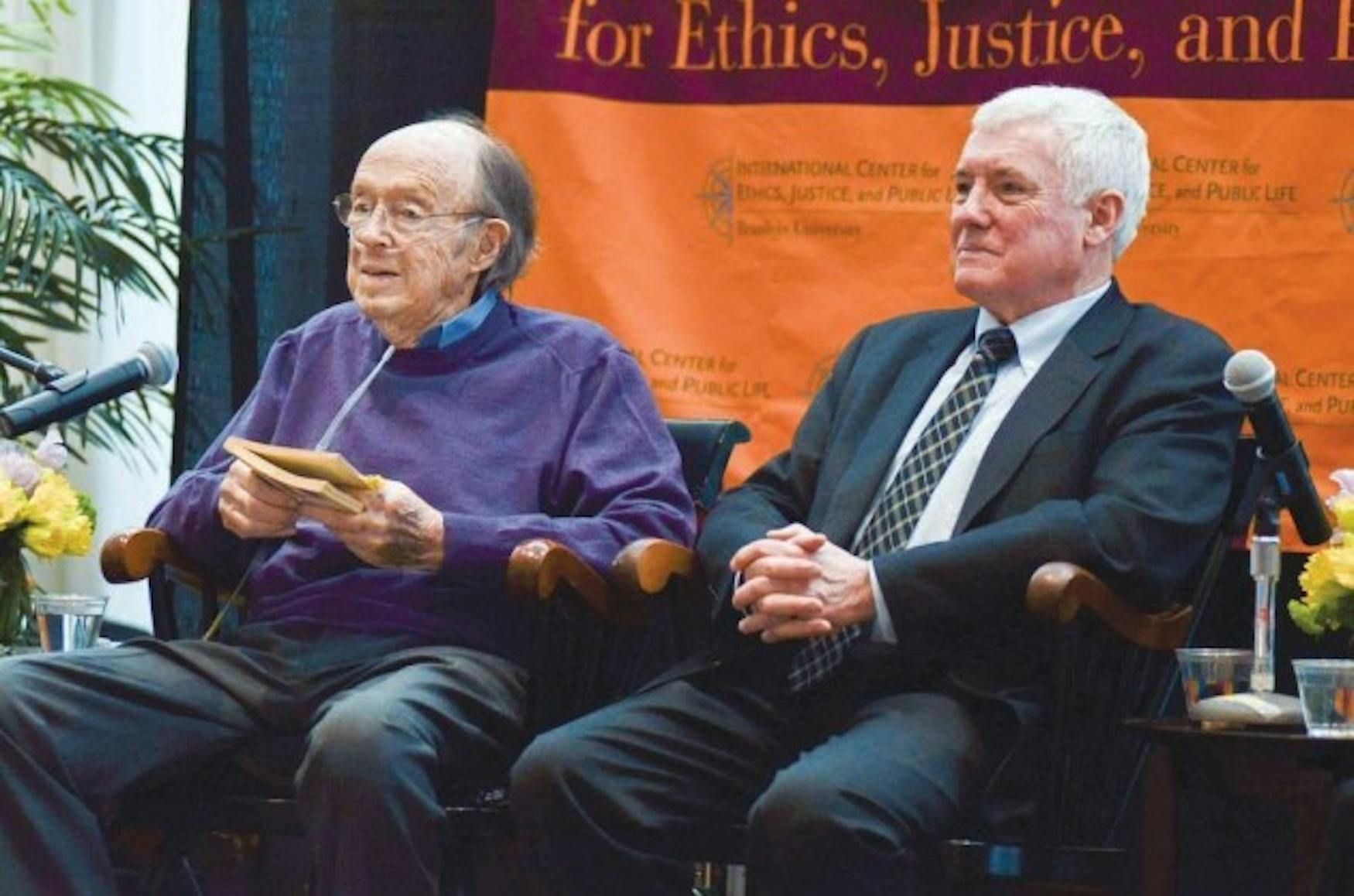Panelists discuss Gideon
Four panelists convened yesterday in Rapaporte Treasure Hall for an event titled "Gideon at 50: The Future of the Right to Counsel" to mark the 50th anniversary of the Gideon v. Wainwright Supreme Court case and the continuing challenges of providing legal counsel to the poor and underserved communities.
The 1963 case granted those accused of criminal, rather than only capital, charges the right to be appointed an attorney should they not be able to afford one, citing the Sixth Amendment's guarantee of counsel.
The panel featured Margot Botsford, Associate Justice to the Supreme Judicial Court of Massachusetts, University President Frederick Lawrence, William Leahy, director of the New York State Office of Indigent Legal Services, and Anthony Lewis, author of Gideon's Trumpet, the 1964 account of the case. Chief of Staff to the President David Bunis '83 moderated the event.
1n 1963, after being charged with breaking and entering with the intent to commit petty larceny, Clarence Earl Gideon requested a lawyer when asked at his trial if he was ready to proceed. After the judge denied his request, Gideon was sentenced to five years in prison; he appealed to the Supreme Court, which ruled that the denial of counsel was a violation of the Constitution.
The Gideon v. Wainwright case overturned the ruling in the 1942 Betts v. Brady case, which denied counsel to indigent defendants when prosecuted by a state.
Bunis directed the first question to Lewis, asking what prompted his passion for the Gideon case. Lewis responded with a passage from his book that marked the overturning of the Betts v. Brady decision. "It had a powerful emotional impact on me," he said.
Lewis said that he wrote the book "with such obvious emotion and commitment" in part because of the details of the case. Gideon's petition to the court was handwritten, he said. "He didn't have a hope, did he?" Lewis continued. "It was quite amazing, and that was part of the romance, for me."
Lewis added that the court even agreeing to take Gideon's case indicated to him that they would likely overrule the Betts v. Brady ruling.
Leahy said that two major realities must be recognized for the Gideon decision to be fully implemented in practice: first, that the federal government, and not only states, must fund the efforts to provide legal aid, and second, that it must bridge the gap between the funding they provide to prosecution and police forces and the lack of funding for public defenders.
Botsford added that states that deal with enforcing the Gideon case on a local basis are worse off than those that deal with it on a statewide basis, such as Massachusetts. "We are incredibly lucky in this state," she said, adding that Massachusetts representation is "excellent," which is not the case everywhere.
Lawrence emphasized the importance of due process, noting that defendants must have their inalienable rights enforced and that the government has the responsibility to make those rights enforceable.
As Bunis opened the floor to audience questions, Leigh Swigart, director of programs in international justice and society at the International Center for Ethics, Justice and Public Life, posed a question about legal models of other countries that the U.S. could look to. Leahy responded that societies that have implemented laws providing universal access to counsel tend to experience "significant pushback" and added that, despite challenges, the British system is "worth emulating."
Jassen Lu '15 asked the panelists why people might be deterred from entering public service. Leahy responded that it is less of an issue of attracting new lawyers to the work than retaining them over time as they work to support their family.
In his conclusion, Lewis said that the way to fully realize the Gideon decision is to educate members of Congress and to encourage a dialogue. He added that Gideon's surname helped to romanticize and bring attention to the case, as it echoes the Biblical Gideon, whose trumpet brought down the wall of the enemy.
"Here's the ancient Hebrew trumpet blowing down the castle walls, and that's what we need," he concluded.
The panel was sponsored by the International Center for Ethics, Justice and Public Life and the Legal Studies Program. Later in the evening, the Brandeis Law Journal hosted a screening of the made-for-television film version of Gideon's Trumpet in the Mandel Center for the Humanities.
Editor's note: Jassen Lu '15 is a Justice staff writer.



Please note All comments are eligible for publication in The Justice.